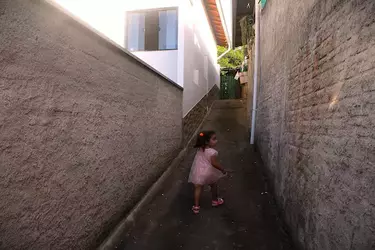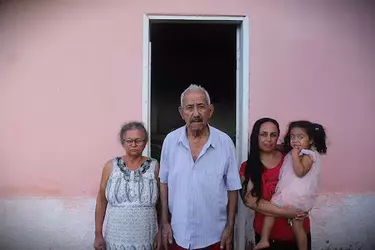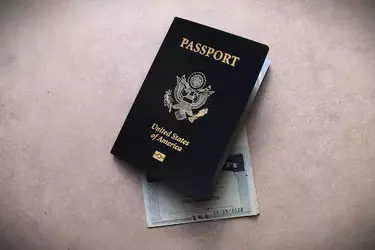Since being flown to Brazil in February, Manu has become all but stateless — removed from her place of birth and not yet adopted by her parents’ home country.

Manu runs up a narrow alley to visit her grandparents’ home in Poté, the rural Brazilian town where she now lives as a tourist, on May 22. (Photos by Terrence McCoy/The Washington Post)
By Terrence McCoy and Marina Dias
POTÉ, Brazil — Elioni Gonçalves awoke with a feeling of dread. Her first thought was of her 2-year-old daughter, Manu.
Manu is American. She was born Emanuelly Borges Santos in a Fort Lauderdale hospital in September 2022. But in February, she was taken into custody in Florida alongside her mother and father, both of whom were undocumented, and placed on a deportation flight to Brazil, where the family has been plunged into a bureaucratic morass.
Manu, who is not a citizen or resident of Brazil, was forced to enter the country as a tourist. In the tense months since, as authorities here tried to figure out how to give her legal status, the girl has been left all but stateless — removed from her country of birth and not yet adopted by her parents’ ancestral home. She has no right to routine pediatric checkups in Brazil’s public health-care system. She cannot easily enroll in a Brazilian school or day care. And she’s living on a temporary tourism visa that’s set to expire in weeks.
All of this was on her mother’s mind, she said, as she got out of bed on a recent morning.
“What if we need to take her to the doctor?” Gonçalves wondered.
As the Trump administration intensifies its immigration crackdown — moving to deport 1 million undocumented immigrants by year’s end — American citizens are being caught in the dragnet. Their removal has raised alarm among judges and legal scholars, who accuse the government of violating due process rights, and it illustrates how many U.S. families have mixed immigration statuses. A 2020 study by the Migration Policy Institute found that 4.4 million American children had at least one undocumented parent.
Last month, at least three American children were sent to Honduras alongside their undocumented mothers. One of the children, who was also 2 years old, was sent against the wishes of her father, court filings assert.

Manu and her mother, Elioni Gonçalves, now live next door to her maternal grandparents, Teresinha Gonçalves Santos and Eliseo de Souza Santos.
The removal of that child elicited a sharp rebuke from Terry A. Doughty, a federal judge in the Western District of Louisiana. He called it “illegal and unconstitutional to deport” U.S. citizens.
The details of Manu’s removal, which occurred on Feb. 21, have not been previously reported.
U.S. Immigration and Customs Enforcement and the Department of Homeland Security did not address the specifics of Manu’s case. In separate statements, both agencies said that in cases like hers, “parents are asked if they want to be removed with their children, or ICE will place the children with someone the parent designates.”
DHS Assistant Secretary Tricia McLaughlin said it was “false and irresponsible” to suggest that the government had deported U.S. citizens.
Gonçalves, 41, and her husband, Edivan Borges dos Santos, 42, both insisted they weren’t given a choice. They would probably have decided to stay together, Gonçalves said. But she added that she has a brother in Pompano Beach, Florida. Perhaps Manu could have stayed with him.
“They simply deported us,” Borges said.
When the family arrived in the northeastern Brazilian city of Fortaleza on a flight carrying 94 deportees, authorities here said they were stunned to find little Manu on the roll call. The only documents she had were an American passport and a U.S. social security card.
“We’d never seen another case like this,” federal police officer Alexsandra Oliveira Medeiros Reis said.

The sun sets over Poté, the small town in Brazil's Minas Gerais state where Manu now lives as a tourist.
An American girl
The family hails from the eastern hills of Minas Gerais, a state known nationally as a hub of illegal immigration to the United States. In the center of the regional hub of Governador Valadares is Emigrant Plaza, with a statue of a traveler in an American baseball hat.Borges and Gonçalves said they never considered leaving until the coronavirus pandemic. Just about everything closed. It was harder to find work. They were living with their son in a half-finished home besides Gonçalves’s parents, unable to fund its completion.
Gonçalves was reluctant, but she had a brother who had already made the journey. After several long conversations, the family flew in 2021 to Mexico, then traveled to the Arizona border, where they crossed over and turned themselves over to ICE.
Citing violence and corruption in Brazil, Borges said the family applied for asylum and were permitted to stay in the country while the courts considered their case. They went to Pompano Beach to reunite with Gonçalves’s brother. Borges quickly began working in construction, where he made nearly 10 times as much as he used to in Brazil. And Gonçalves was soon pregnant with their second child.
After Manu’s birth, the family settled into a comfortable if uneasy American existence. They didn’t speak any English, and Borges often needed an interpreter to communicate with immigration authorities. In December 2022, according to ICE officials, the couple received a deportation order, and Borges was later outfitted with an electronic ankle bracelet. In March 2024, Gonçalves said, the family’s Brazilian documents were confiscated.
“Travel documents are requested to facilitate compliance,” said ICE public affairs officer Nestor Yglesias.
Only later did Borges realize what that meant: Without the documents, they couldn’t prove their own nationality and, as a result, couldn’t obtain Brazilian citizenship for Manu at the local consulate. She would only be American.
“We were caught taking a nap,” Gonçalves conceded.

Manu loves watching American cartoons and adores Minnie Mouse.
In February of this year, Borges said he was called into ICE offices in Miramar, Florida, and told to bring his entire family.
His attorney had previously filed a court motion to stay their deportation, he said, citing his American daughter. But thinking they might be deported anyway, Gonçalves and Borges packed their bags and got their children ready.
They met up with their interpreter, Dani Ribeiro, but she was denied entry by ICE officials, who said the agency would provide its own interpreters.
“I didn’t trust these people,” Ribeiro said. “I wanted to go in.”
Gonçalves said an interpreter was put on the phone, who told them their stay request had been denied. The couple recounted being given forms in English to sign. They didn’t know what they said but signed them anyway.
After being given back their Brazilian documents, the family was flown to North Carolina, then Louisiana and, finally, to Brazil. Their Florida attorney said he was outraged when he found out what had happened.
“The U.S. government is deporting their own citizen,” said the attorney, who spoke on the condition of anonymity for fear of government retaliation.

The only identifying documents Manu had when she was sent on a deportation flight to Brazil were her U.S. passport and her Social Security card.
‘She is not Brazilian’
Brazilian officials were puzzled. To Edilson Santana, an attorney in the Ceará public defender’s officer, there were only two possible scenarios. Either the U.S. government was somehow asserting that Manu wasn’t an American citizen, despite her documentation, or America had just broken its own laws, he said.This was, he said, the “deportation of a national.”
Her immigration status isn’t easy to rectify, Santana said. Brazil has two primary methods of granting citizenship. One is birth citizenship, and the other is performed by the consulate service for births abroad. With Manu ineligible for both, officials are trying to invent a third way, making her a “temporary” citizen until she turns 18.
But all of that will take time. As it stands now, he said, “she is not Brazilian.” She is a tourist.
Gonçalves tried to put it out of her mind as she settled Manu in front of her iPad on a recent morning and put on one of her favorite cartoons, “BabyBus.” Gonçalves said she wanted her to continue learning English.
Most days now it’s just the two of them. Borges was off at a jobsite on the other side of the country. Her son was at school.
“She sees other kids very rarely,” Gonçalves said.
So the mother decided to take her daughter out to play. She told Manu it was time to visit her grandparents’ house next door, where there was a trampoline.
Manu slid on her Crocs, yelling, “Shoes!” in English, then ran for the door.
Next door, Gonçalves placed her daughter inside the trampoline. Then she stood back and watched her jump up and down, up and down, her American girl giggling in the day’s last light.
Source (Archive)
